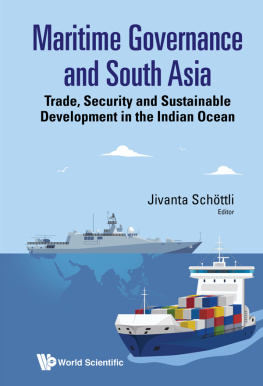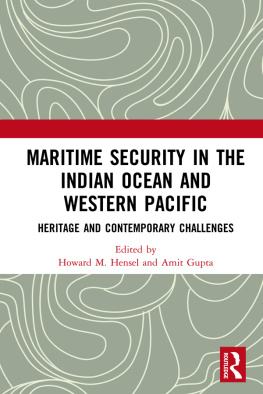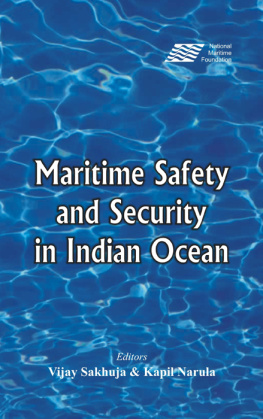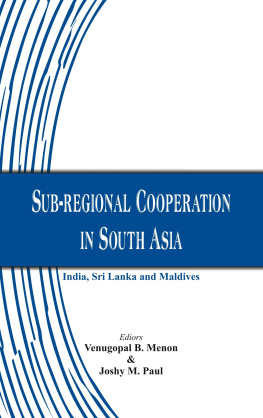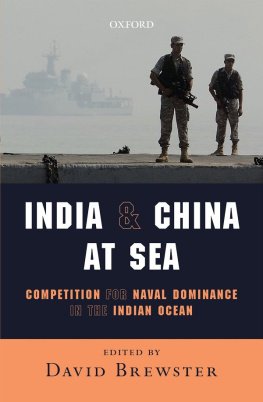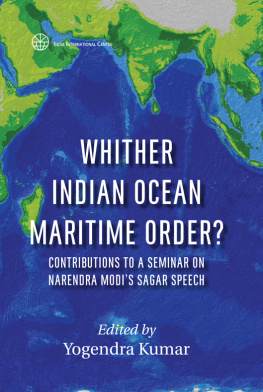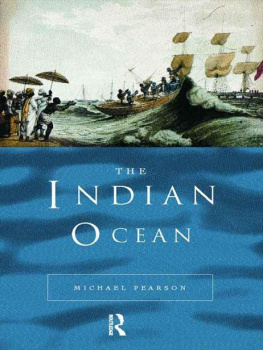Maritime Governance and South Asia
Trade, Security and SustainableDevelopment in the lndian Ocean
Maritime Governance and South Asia
Trade, Security and Sustainable Development in the Indian Ocean
Editor
Jivanta Schttli
Institute of South Asian Studies (ISAS) NUS, Singapore
Published by
World Scientific Publishing Co. Pte. Ltd.
5 Toh Tuck Link, Singapore 596224
USA office: 27 Warren Street, Suite 401-402, Hackensack, NJ 07601
UK office: 57 Shelton Street, Covent Garden, London WC2H 9HE
Library of Congress Cataloging-in-Publication Data
Names: Schttli, Jivanta, editor.
Title: Maritime governance and South Asia : trade, security and sustainable development in the Indian Ocean / editor, Jivanta Schttli (NUS, Singapore).
Description: New Jersey : World Scientific, [2018] | Includes bibliographical references and index.
Identifiers: LCCN 2018001027 | ISBN 9789813238220
Subjects: LCSH: Indian Ocean Region--Foreign relations. | Indian Ocean Region--Foreign economic relations. | Indian Ocean Region--Commerce.
Classification: LCC DS341 .M374 2018 | DDC 355/.0330182/4--dc23
LC record available at https://lccn.loc.gov/2018001027
British Library Cataloguing-in-Publication Data
A catalogue record for this book is available from the British Library.
Copyright 2018 by World Scientific Publishing Co. Pte. Ltd.
All rights reserved. This book, or parts thereof, may not be reproduced in any form or by any means, electronic or mechanical, including photocopying, recording or any information storage and retrieval system now known or to be invented, without written permission from the publisher.
For photocopying of material in this volume, please pay a copying fee through the Copyright Clearance Center, Inc., 222 Rosewood Drive, Danvers, MA 01923, USA. In this case permission to photocopy is not required from the publisher.
For any available supplementary material, please visit
http://www.worldscientific.com/worldscibooks/10.1142/10937#t=suppl
Desk Editor: Shreya Gopi
Typeset by Stallion Press
Email:
Printed in Singapore
Contents
Shivshankar Menon
Harsha de Silva
Md. Khurshed Alam
K. V. Bhagirath
Frank Lavin
Abhay Kumar Singh
Adriana Elisabeth
Deepa M. Ollapally
David Brewster
Martin A. Sebastian RMN (R)
V. N. Attri
Yogendra Kumar
Christopher Len
Hoseana Bohela Lunogelo
Marianne Pron-Doise
James Alix Michel
Foreword
Tommy Koh
On 29 March 2016, I was asked to deliver the welcome remarks for a conference on Maritime Governance in South Asia: The potential for Trade, Security and Sustainable Development. The conference was organized by the Institute of South Asian Studies and I was happy to accept the invitation from Ambassador Gopinath Pillai, Chairman of ISAS and Professor Subrata Mitra, Director of ISAS. Among the participants were old friends including Ambassador Munshi Faiz Ahmad, the former High Commissioner of Bangladesh to Singapore; Professor Bob Carr, the former Foreign Minister of Australia; Ambassador Frank Lavin, the former US Ambassador to Singapore; and Professor SD Muni.
I began with a comment on the topic of Maritime Governance in South Asia. Present with us, was a colleague from Tanzania. Tanzania is not part of South Asia but it is certainly part of the Indian Ocean. Australia is also not part of South Asia. I therefore proposed interpreting South Asia liberally to mean the Indian Ocean and I am glad to see that the book, which has emerged from the conference, has taken on the suggestion to broaden maritime governance in South Asia to the Indian Ocean. Our topic invited us to examine the Indian Oceans potential for trade, security and sustainable development. Let me turn first to trade.
Trade in the Indian Ocean
The historical record shows that for approximately 2000 years, the countries and peoples of West Asia, South Asia and Southeast Asia had been trading peacefully with one another. Trade was facilitated by the monsoon winds, which blow for six months from the NorthEast to the SouthWest and for another six months in the opposite direction. Up until the arrival of the Europeans, the regime was free trade. The Europeans replaced the regime of free trade with monopoly. In an interesting way, our future is our past. We are seeking to recreate in the Indian Ocean, the regime of free trade which flourished until the arrival of the European colonial powers. The Chinese initiative, One Belt One Road (now known as the Belt and Road Initiative), will add impetus to our quest. I support the initiative to recreate the Maritime Silk road. To succeed, it must be based on trust, the rule of law and freedom of navigation and free trade.
The Exchange of Ideas, Culture, Religions and People
Sugata Bose, in his brilliant book, A Hundred Horizons: the Indian Ocean in the Age of Global Empire, was right to call our attention to the fact that, in addition to trade in goods, there was also a flow of ideas and culture. I would add religion and the migration of people to his list.
Hinduism was exported from India to Southeast Asia. This was followed by Mahayana and Theravada Buddhism. This was, in turn, followed by Islam, transmitted by Arab traders and missionaries. The civilization of Southeast Asia contains all three layers of religious penetrations. Religious diversity and multiculturalism are in the DNA of Southeast Asia.
The migration of people from one part of the Indian Ocean to another, has also been going on for thousands of years. One of the most interesting examples was the migration of Indonesian seafarers to Madagascar. The people of Madagascar and its language, Malagasy, exhibit Indonesian characteristics.
I accept Sugata Boses exhortation that, The exploration of the Indian Ocean as a cultural milieu is getting as important as its role as a trading zone.
Security: Indian Ocean as an Ocean of Peace, Friendship and Cooperation
My vision for the Indian Ocean is an Ocean of Peace, Friendship and Cooperation. What must we do in order to achieve this vision? The first requirement is that we be prepared to live at peace with one another. We should act in accordance with the principles of the UN Charter. The sea should be used for peaceful purposes. We should refrain from using the sea to launch attacks on our neighbours. If disputes arise between states, they should be settled peacefully, in accordance with international law. We want relations between states to be based on the rule of law and not on might is right. We do not want the Indian Ocean to become a theatre of great-power competition. Sates should cooperate with one another to suppress piracy and other threats to international shipping.
The law governing the Indian Ocean is international law, including the United Nations Convention on the Law of the Sea. I regret the fact that not all Indian Ocean Rim countries are parties to the convention. I also regret the fact that some of the states which are parties to the convention, have made excessive claims, which are not consistent with the convention. That is the bad news. The good news is that several of the countries have settled their disputes over their maritime boundaries peacefully and in accordance with the law. For example, Bangladesh and Myanmar referred their dispute to the International Tribunal for the Law of the Sea. Bangladesh and India referred their dispute to arbitration. I hope that other states, with outstanding maritime boundary disputes, will emulate the examples of Bangladesh, India and Myanmar.

